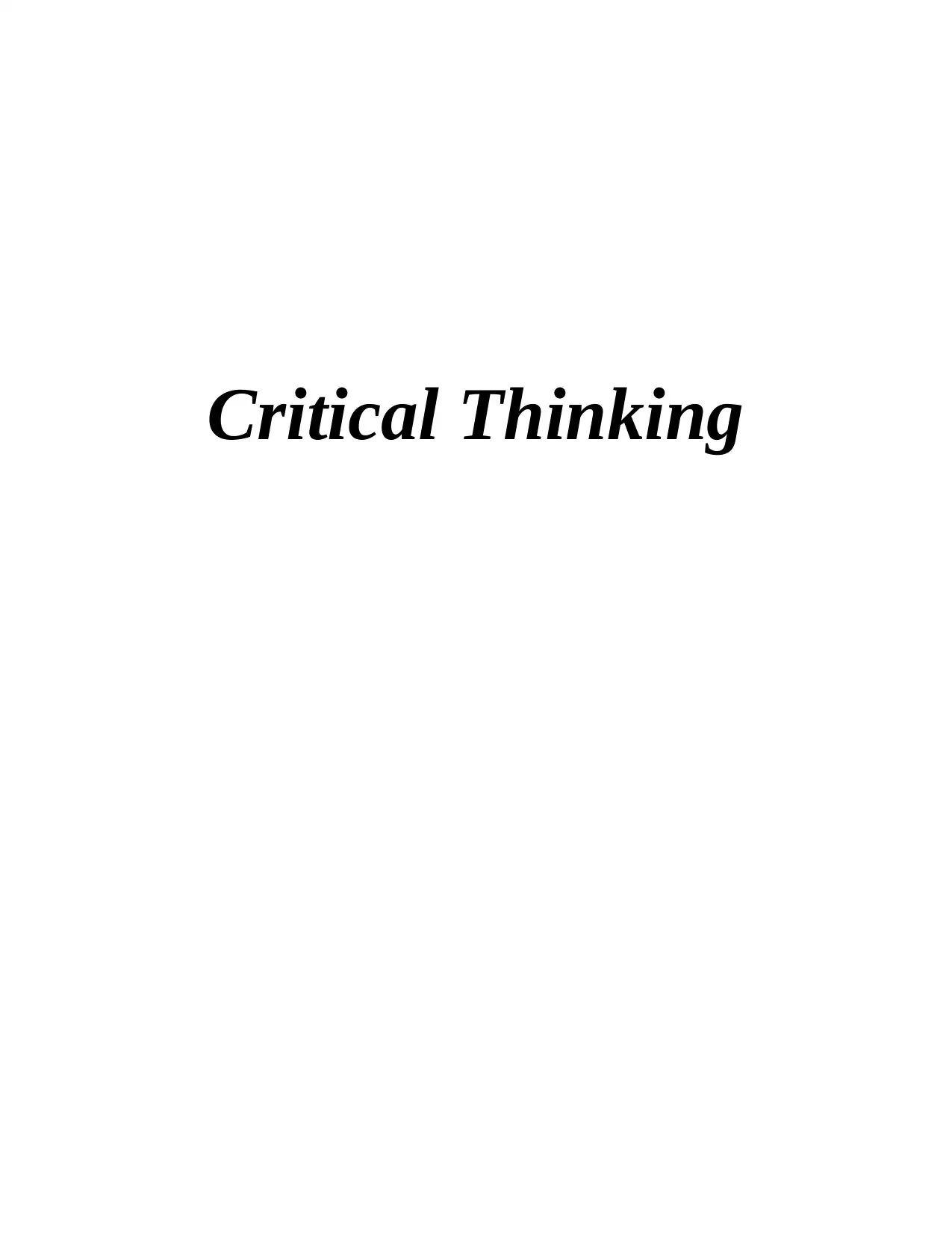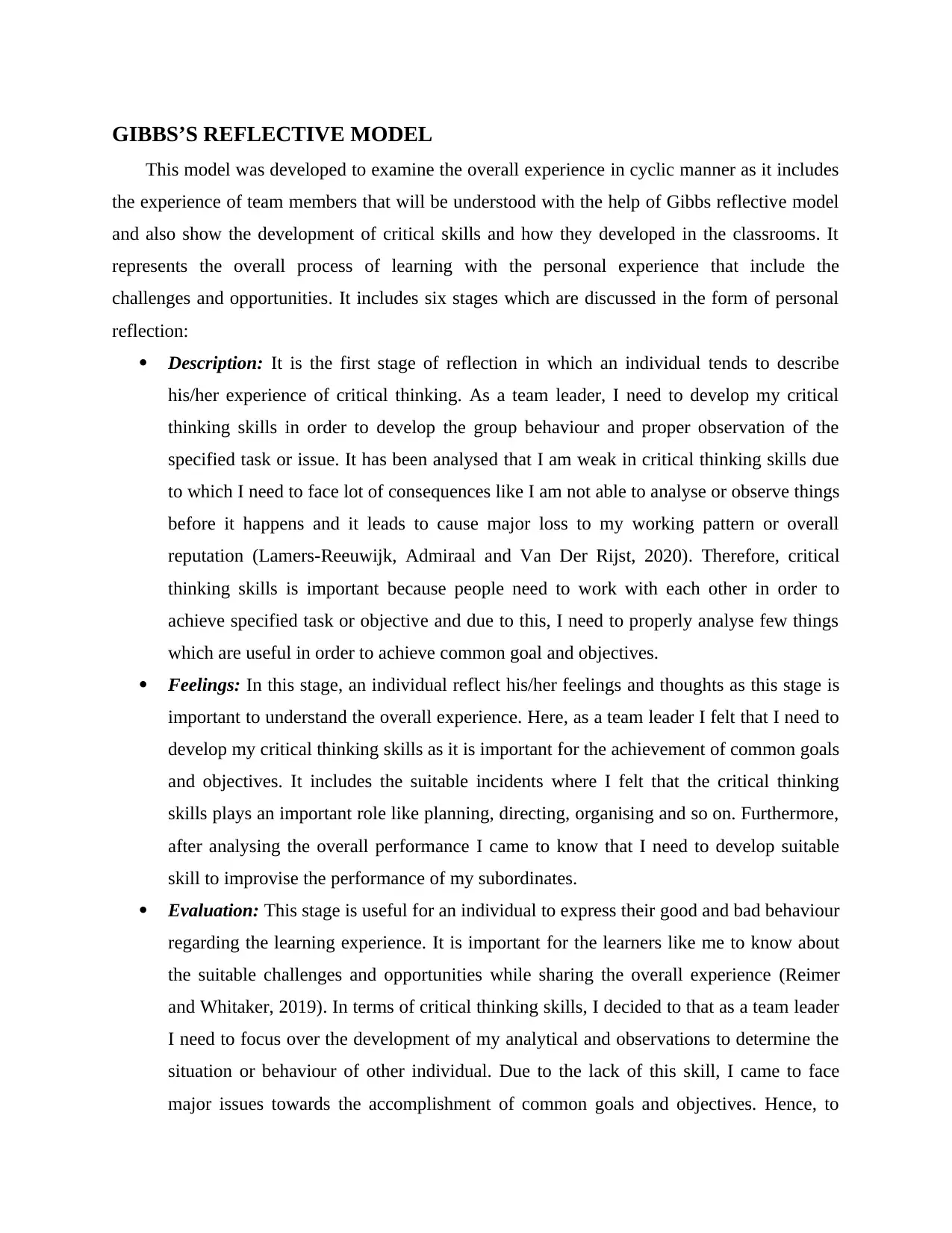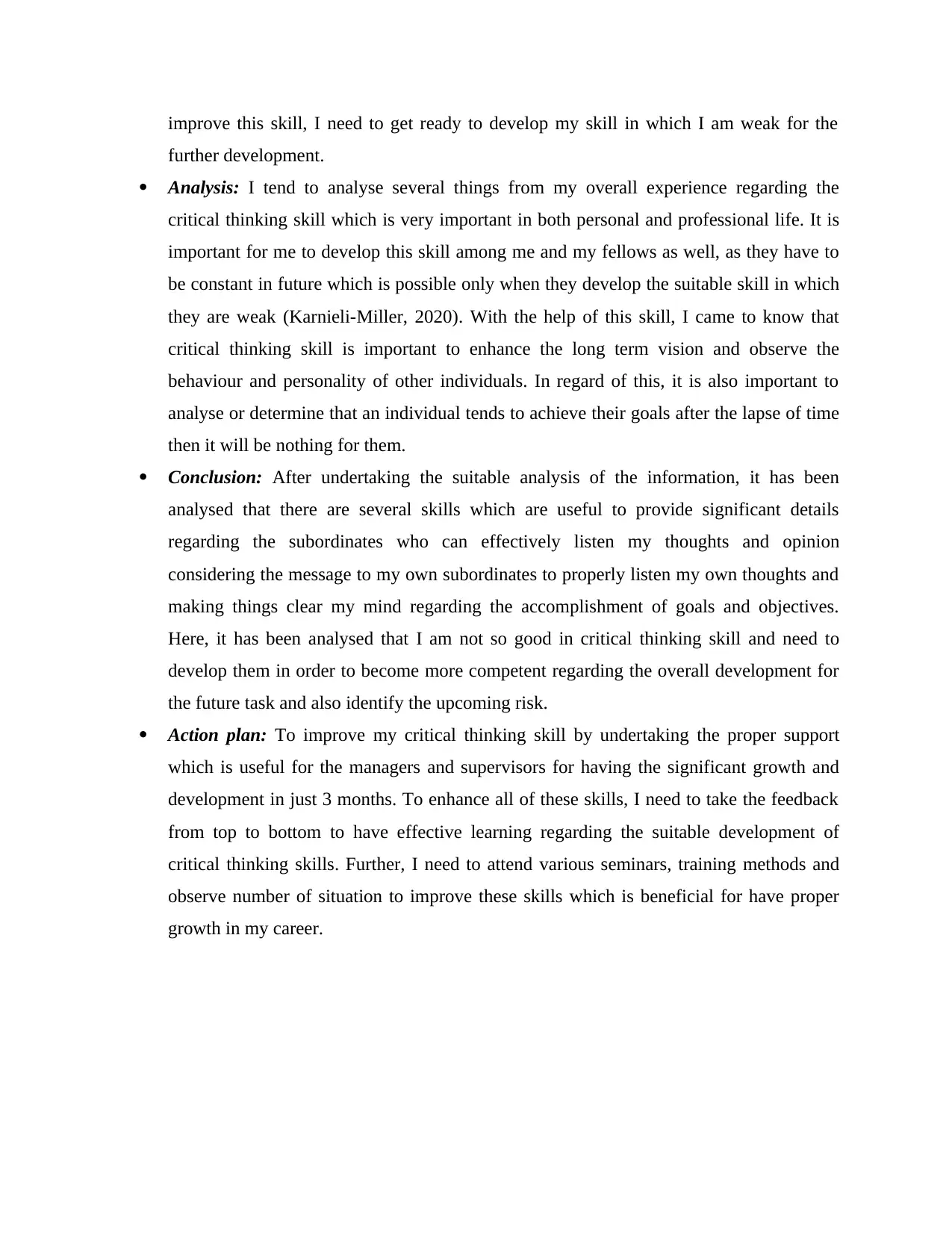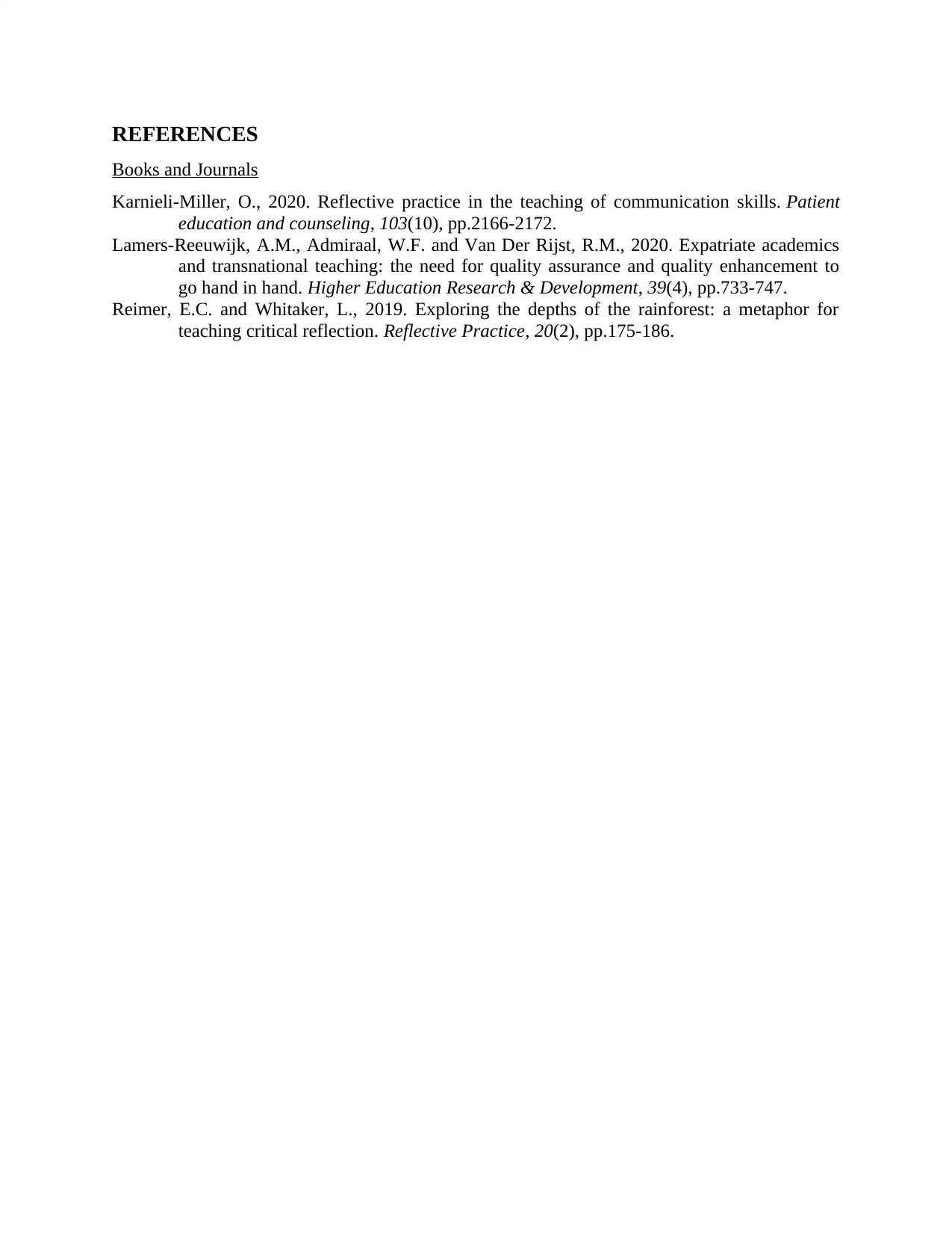Developing Critical Thinking Skills: A Gibbs Reflective Model Essay
VerifiedAdded on 2023/06/18
|4
|954
|113
Essay
AI Summary
This essay employs Gibbs' Reflective Model to analyze the development of critical thinking skills within a team leadership context. It reflects on personal experiences, feelings, evaluations, and analysis related to critical thinking. The conclusion highlights the importance of these skills for future tasks and risk identification. The essay also includes an action plan to improve critical thinking skills through training, feedback, and observation. References to academic sources are provided to support the analysis and reflection process. Desklib offers a wealth of similar solved assignments and past papers for students seeking academic assistance.

Critical Thinking
Paraphrase This Document
Need a fresh take? Get an instant paraphrase of this document with our AI Paraphraser

GIBBS’S REFLECTIVE MODEL
This model was developed to examine the overall experience in cyclic manner as it includes
the experience of team members that will be understood with the help of Gibbs reflective model
and also show the development of critical skills and how they developed in the classrooms. It
represents the overall process of learning with the personal experience that include the
challenges and opportunities. It includes six stages which are discussed in the form of personal
reflection:
Description: It is the first stage of reflection in which an individual tends to describe
his/her experience of critical thinking. As a team leader, I need to develop my critical
thinking skills in order to develop the group behaviour and proper observation of the
specified task or issue. It has been analysed that I am weak in critical thinking skills due
to which I need to face lot of consequences like I am not able to analyse or observe things
before it happens and it leads to cause major loss to my working pattern or overall
reputation (Lamers-Reeuwijk, Admiraal and Van Der Rijst, 2020). Therefore, critical
thinking skills is important because people need to work with each other in order to
achieve specified task or objective and due to this, I need to properly analyse few things
which are useful in order to achieve common goal and objectives.
Feelings: In this stage, an individual reflect his/her feelings and thoughts as this stage is
important to understand the overall experience. Here, as a team leader I felt that I need to
develop my critical thinking skills as it is important for the achievement of common goals
and objectives. It includes the suitable incidents where I felt that the critical thinking
skills plays an important role like planning, directing, organising and so on. Furthermore,
after analysing the overall performance I came to know that I need to develop suitable
skill to improvise the performance of my subordinates.
Evaluation: This stage is useful for an individual to express their good and bad behaviour
regarding the learning experience. It is important for the learners like me to know about
the suitable challenges and opportunities while sharing the overall experience (Reimer
and Whitaker, 2019). In terms of critical thinking skills, I decided to that as a team leader
I need to focus over the development of my analytical and observations to determine the
situation or behaviour of other individual. Due to the lack of this skill, I came to face
major issues towards the accomplishment of common goals and objectives. Hence, to
This model was developed to examine the overall experience in cyclic manner as it includes
the experience of team members that will be understood with the help of Gibbs reflective model
and also show the development of critical skills and how they developed in the classrooms. It
represents the overall process of learning with the personal experience that include the
challenges and opportunities. It includes six stages which are discussed in the form of personal
reflection:
Description: It is the first stage of reflection in which an individual tends to describe
his/her experience of critical thinking. As a team leader, I need to develop my critical
thinking skills in order to develop the group behaviour and proper observation of the
specified task or issue. It has been analysed that I am weak in critical thinking skills due
to which I need to face lot of consequences like I am not able to analyse or observe things
before it happens and it leads to cause major loss to my working pattern or overall
reputation (Lamers-Reeuwijk, Admiraal and Van Der Rijst, 2020). Therefore, critical
thinking skills is important because people need to work with each other in order to
achieve specified task or objective and due to this, I need to properly analyse few things
which are useful in order to achieve common goal and objectives.
Feelings: In this stage, an individual reflect his/her feelings and thoughts as this stage is
important to understand the overall experience. Here, as a team leader I felt that I need to
develop my critical thinking skills as it is important for the achievement of common goals
and objectives. It includes the suitable incidents where I felt that the critical thinking
skills plays an important role like planning, directing, organising and so on. Furthermore,
after analysing the overall performance I came to know that I need to develop suitable
skill to improvise the performance of my subordinates.
Evaluation: This stage is useful for an individual to express their good and bad behaviour
regarding the learning experience. It is important for the learners like me to know about
the suitable challenges and opportunities while sharing the overall experience (Reimer
and Whitaker, 2019). In terms of critical thinking skills, I decided to that as a team leader
I need to focus over the development of my analytical and observations to determine the
situation or behaviour of other individual. Due to the lack of this skill, I came to face
major issues towards the accomplishment of common goals and objectives. Hence, to

improve this skill, I need to get ready to develop my skill in which I am weak for the
further development.
Analysis: I tend to analyse several things from my overall experience regarding the
critical thinking skill which is very important in both personal and professional life. It is
important for me to develop this skill among me and my fellows as well, as they have to
be constant in future which is possible only when they develop the suitable skill in which
they are weak (Karnieli-Miller, 2020). With the help of this skill, I came to know that
critical thinking skill is important to enhance the long term vision and observe the
behaviour and personality of other individuals. In regard of this, it is also important to
analyse or determine that an individual tends to achieve their goals after the lapse of time
then it will be nothing for them.
Conclusion: After undertaking the suitable analysis of the information, it has been
analysed that there are several skills which are useful to provide significant details
regarding the subordinates who can effectively listen my thoughts and opinion
considering the message to my own subordinates to properly listen my own thoughts and
making things clear my mind regarding the accomplishment of goals and objectives.
Here, it has been analysed that I am not so good in critical thinking skill and need to
develop them in order to become more competent regarding the overall development for
the future task and also identify the upcoming risk.
Action plan: To improve my critical thinking skill by undertaking the proper support
which is useful for the managers and supervisors for having the significant growth and
development in just 3 months. To enhance all of these skills, I need to take the feedback
from top to bottom to have effective learning regarding the suitable development of
critical thinking skills. Further, I need to attend various seminars, training methods and
observe number of situation to improve these skills which is beneficial for have proper
growth in my career.
further development.
Analysis: I tend to analyse several things from my overall experience regarding the
critical thinking skill which is very important in both personal and professional life. It is
important for me to develop this skill among me and my fellows as well, as they have to
be constant in future which is possible only when they develop the suitable skill in which
they are weak (Karnieli-Miller, 2020). With the help of this skill, I came to know that
critical thinking skill is important to enhance the long term vision and observe the
behaviour and personality of other individuals. In regard of this, it is also important to
analyse or determine that an individual tends to achieve their goals after the lapse of time
then it will be nothing for them.
Conclusion: After undertaking the suitable analysis of the information, it has been
analysed that there are several skills which are useful to provide significant details
regarding the subordinates who can effectively listen my thoughts and opinion
considering the message to my own subordinates to properly listen my own thoughts and
making things clear my mind regarding the accomplishment of goals and objectives.
Here, it has been analysed that I am not so good in critical thinking skill and need to
develop them in order to become more competent regarding the overall development for
the future task and also identify the upcoming risk.
Action plan: To improve my critical thinking skill by undertaking the proper support
which is useful for the managers and supervisors for having the significant growth and
development in just 3 months. To enhance all of these skills, I need to take the feedback
from top to bottom to have effective learning regarding the suitable development of
critical thinking skills. Further, I need to attend various seminars, training methods and
observe number of situation to improve these skills which is beneficial for have proper
growth in my career.
⊘ This is a preview!⊘
Do you want full access?
Subscribe today to unlock all pages.

Trusted by 1+ million students worldwide

REFERENCES
Books and Journals
Karnieli-Miller, O., 2020. Reflective practice in the teaching of communication skills. Patient
education and counseling, 103(10), pp.2166-2172.
Lamers-Reeuwijk, A.M., Admiraal, W.F. and Van Der Rijst, R.M., 2020. Expatriate academics
and transnational teaching: the need for quality assurance and quality enhancement to
go hand in hand. Higher Education Research & Development, 39(4), pp.733-747.
Reimer, E.C. and Whitaker, L., 2019. Exploring the depths of the rainforest: a metaphor for
teaching critical reflection. Reflective Practice, 20(2), pp.175-186.
Books and Journals
Karnieli-Miller, O., 2020. Reflective practice in the teaching of communication skills. Patient
education and counseling, 103(10), pp.2166-2172.
Lamers-Reeuwijk, A.M., Admiraal, W.F. and Van Der Rijst, R.M., 2020. Expatriate academics
and transnational teaching: the need for quality assurance and quality enhancement to
go hand in hand. Higher Education Research & Development, 39(4), pp.733-747.
Reimer, E.C. and Whitaker, L., 2019. Exploring the depths of the rainforest: a metaphor for
teaching critical reflection. Reflective Practice, 20(2), pp.175-186.
1 out of 4
Related Documents
Your All-in-One AI-Powered Toolkit for Academic Success.
+13062052269
info@desklib.com
Available 24*7 on WhatsApp / Email
![[object Object]](/_next/static/media/star-bottom.7253800d.svg)
Unlock your academic potential
Copyright © 2020–2025 A2Z Services. All Rights Reserved. Developed and managed by ZUCOL.





